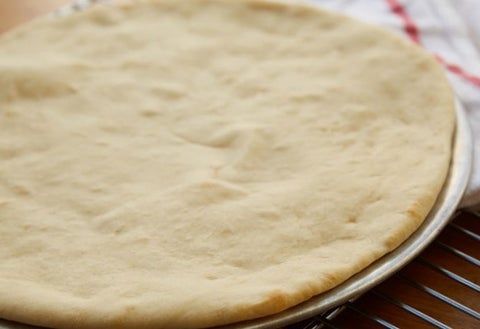00 Grade Flour is Perfect for Pizzas
Making pizza dough isn’t as simple as just mixing flour and yeast together – and flour isn’t as straightforward as you would think, with a dizzying variety of types on offer and each with their own code names. Ask an Italian baker to give you some flour and you’ll likely be quizzed on whether you want grade 2, 1, 0 or 00 flours.
While this might sound like an odd scoring system, these numbers actually refer to how much of the bran and germ has been removed from the flour, and how finely ground the flour is itself. For example, grade 2 gives you coarse wholemeal flour, while 00 grade flour – also known as Doppio Zero, meaning “double zero” – is the most refined variant with the lowest bran content. It is also as soft as talcum powder, making it unique among any other flour you would find in a grocery store.
Why is 00 grade flour perfect for pizza dough?
Sharing similarities with the unbleached plain flour produced by mixing together hard and soft wheat, 00 grade flour contains less gluten than the more coarsely ground flours used when baking bread. The gluten is what gives flour its elastic properties when rolled and stretched, so the low gluten percentage is what makes 00 grade flour the silkiest kind of flour for making pizza.
That low gluten content - just 12% - is what prevents the dough from becoming overly heavy and producing a thicker, more stodgy pizza base. Indeed, 00 grade flour is usually identified as an Italian flour for this very reason, because a well-known dish from that region, Pizza Napoletana, characteristically features a thin base at the middle and a thicker crust that balloons slightly at the rim. It is 00 grade flour that offers the best dough for these qualities in this Italian pizza, hence its being specifically known as an Italian flour.
Why should I use 00 grade flour over normal flour?
The major difference between 00 grade flour and your everyday all-purpose flour when making is its need for more water, as 00 grade is so fine that it absorbs fluid very quickly. This does make it easier to shape, however, as the fineness of the milled grain in type 00 flour allows it to be shaped and handled with less pressure. Additionally, the use of olive oil – which one would often need for coarser types of flour, in order to soften it – is not strictly necessary with 00 grade flour, but is still encouraged for those who simply like the taste.

The goal here is to end up with a moist and almost sticky dough, as this will allow it to be easily shaped into a pizza base. Should you find yourself running low on 00 grade flour when making pizza, you can substitute in the necessary volume of ordinary high-grade flour, which is sufficiently refined to match the smoothness of the 00 grade flour to maintain a consistent texture. Although, if you do make pizza dough from this finer flour and don’t plan on using it immediately, it is advised that you refrigerate it in a closed container and remove one hour before use, to allow it to soften slightly.
Where to find the very best 00 grade flour
Forno Bravo, the California-based pizza oven manufacturer, prides itself on offering the world’s best wood-fired ovens for restaurants, cafés, and home kitchens, both indoors and out. Given their passion for Italian cuisine, they also offer a wide range of ingredients, including an array of authentic flours from the near-century-old Neapolitan flour miller Molino Caputo. Naturally, the prize item in their online store is Antico Molino Caputo Tipo 00 flour, which has been made in Naples by the Caputo family across three generations.
Available for American buyers in 55lb sacks, Tipo 00 Caputo flour is exported all over the world and, as a pizza flour, is commonly regarded as the number-one choice. Such is Molino Caputo’s reputation, for they know how to source the very best grain and ensure that every batch of flour produced exactly replicates the previous batch, in terms of smoothness and refinement. Quality and consistency in equal measure, under a guarantee that the flour exported to restaurants requires no blending to their purposes. Simply put, Caputo pizza flour is for pizzas and can be used as soon as it is delivered.
The fact that their Tipo 00 flour is also 100% natural, free of a single additive, is another reason for the reputation enjoyed by Molino Caputo. Some mills may opt to expand their flour in order to satisfy the 14-15% gluten content required to make bread flour, but Molino Caputo instead achieves the desired flour consistency thanks to the quality of their gluten, rather than the quantity.

While a traditional, family-run Naples business in operation for almost a hundred years, Molino Caputo have embraced modern tools to improve their product. In an on-site lab within their factory, they use computers to test for a range of variables in their flour: how fast the dough can be stretched without tearing it, how much pressure is required to expand it, and how thinly the dough can be stretched before breaking. Innumerable types of grains are tested for these purposes, to see how the flour produced can be improved to perform better in such tests.
And here endeth the lesson, a crash course in one of the most sought-after and perhaps little-known kinds of flour. If you feel inspired to try out some of this silky smooth pizza flour for yourself, try experimenting with and without olive oil to see which results you prefer. This basil-infused olive oil would be a great place to start, though, as the spicy warmth of the herb would go very nicely with a rich tomato base when making pizza at home.

